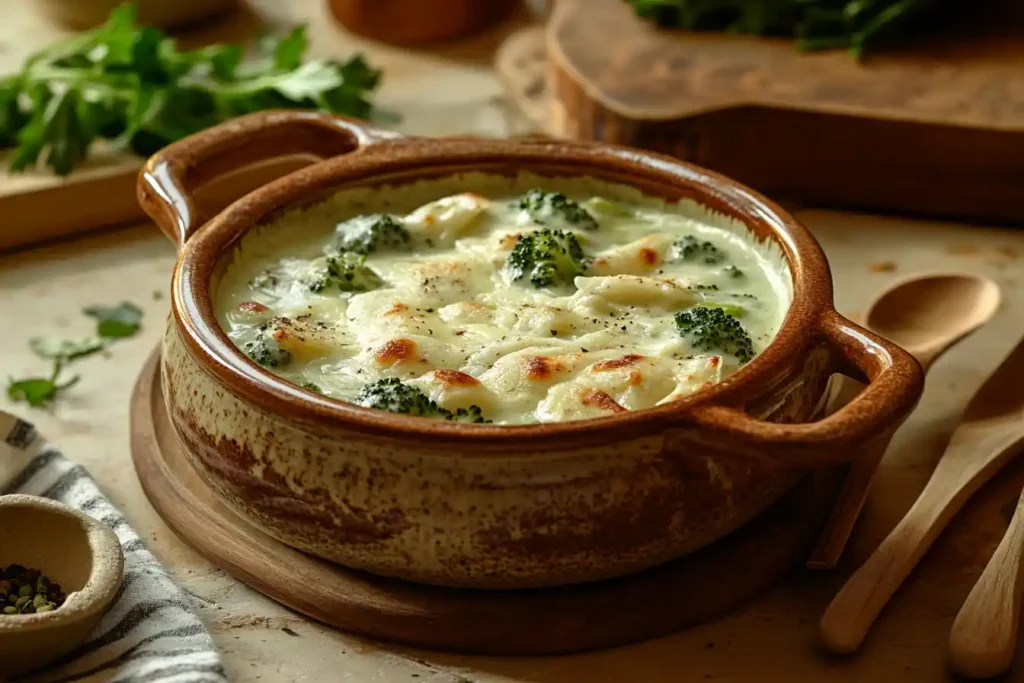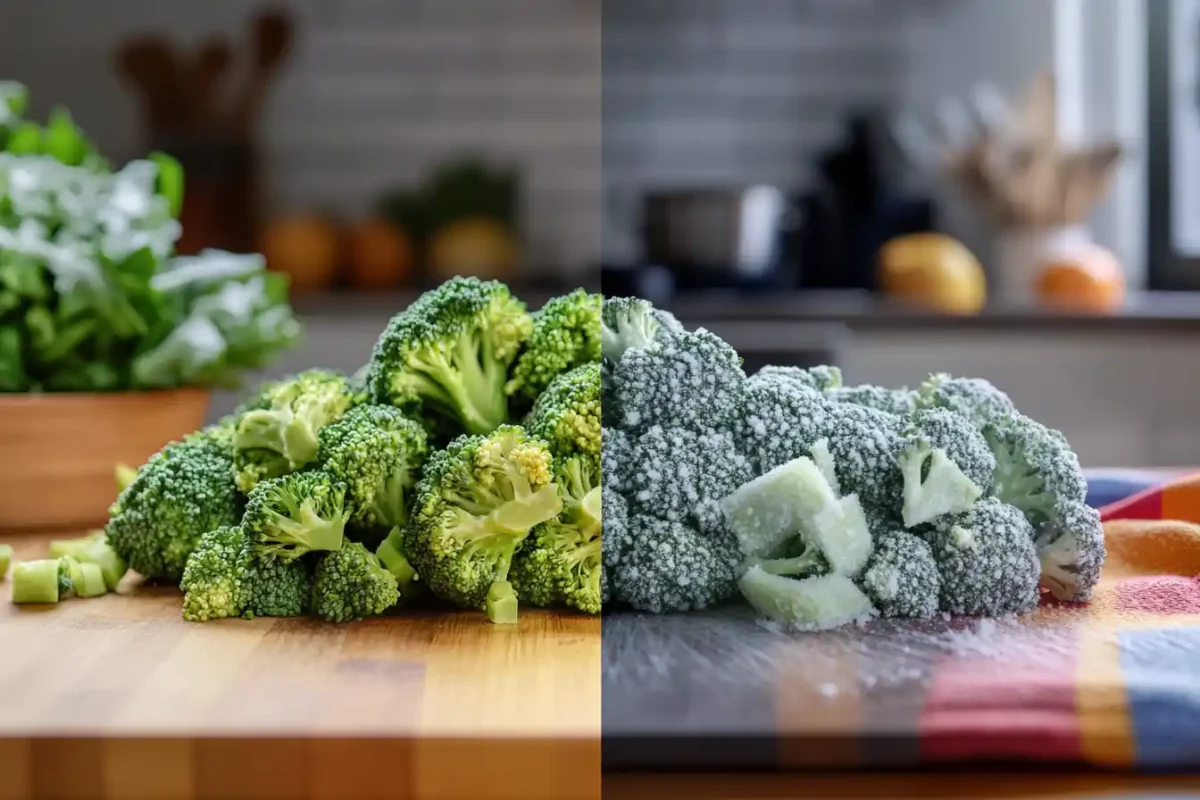Is it better to use fresh or frozen broccoli in a casserole? This question often pops up when making this classic dish, such as our Chicken Broccoli Rice Casserole. Therefore, we will explore how each type affects the final result. Ultimately, the choice depends on your needs.
Fresh vs. Frozen Broccoli: The Casserole Showdown
When making a broccoli casserole, the type of broccoli you choose is important. Let’s look at the pros and cons of using fresh or frozen broccoli to see which works best for your dish. The goal is to make a tasty and satisfying casserole.
Fresh Broccoli for Casserole: A Closer Look
Using fresh broccoli in a casserole has its perks. For example, it often looks brighter and has a firmer texture. Fresh broccoli also has a stronger, fresher flavor. However, it needs preparation, like washing and cutting, which can take extra time. Also, fresh broccoli doesn’t stay fresh for long. If not used soon after buying, its taste and texture may not be as good.
The Advantages of Fresh Broccoli
- Brighter color, making the dish more appealing.
- Firmer texture.
- A more robust, natural flavor.
- A satisfying crunch.
- Perceived as “healthier.”
The Drawbacks of Fresh Broccoli
- Requires washing and cutting, adding preparation time.
- Can spoil quickly, requiring immediate usage after purchase.
- May not be available out of season.
- Can sometimes be more expensive, depending on the season and location.
Why Choose Frozen Broccoli for Your Casserole?
Frozen broccoli has many benefits for casseroles. It’s usually pre-cut and washed, which saves you time. It’s also convenient, available all year, and often more affordable. Frozen broccoli is frozen at its freshest, keeping its nutrients. However, it can be softer when cooked, so it might not have the same firm texture as fresh broccoli.
The Benefits of Frozen Broccoli
- Convenient, pre-cut and washed.
- Readily available year-round.
- Cost-effective, especially when fresh broccoli is out of season.
- Retains nutrients due to freezing at peak freshness.
- Reduces meal prep time considerably.
The Disadvantages of Frozen Broccoli
- Can become softer when cooked.
- May not have the same crisp texture as fresh broccoli.
- Sometimes retains more water, potentially affecting casserole consistency.
Impact on Casserole Texture and Taste
The choice between fresh and frozen broccoli affects the texture and taste of the casserole. Fresh broccoli gives a firmer texture and stronger flavor, while frozen broccoli is softer, which can make the casserole more tender. To balance this, proper preparation is important. Also, frozen broccoli releases more water, so you may need to reduce other liquids in the recipe to prevent a watery casserole.
Maintaining Ideal Texture With Fresh Broccoli
To make the most of fresh broccoli, follow these steps. Firstly, briefly blanch the florets. This will help keep their vibrant color and crunch. Secondly, pat them dry thoroughly before adding them to the casserole. These steps will prevent excess moisture in the dish. Consequently, you achieve a better overall texture.
Optimizing Texture With Frozen Broccoli
When using frozen broccoli, it’s important to thaw and drain it well. Frozen broccoli holds a lot of water, so squeezing out the extra moisture is necessary to avoid a watery casserole. You might also need to adjust the baking time since frozen broccoli is usually partially cooked.
Naturally Enhancing Flavor with Either Option
No matter which type of broccoli you choose, bringing out its natural flavor is important. Adding herbs, spices, and cheese can make the casserole even tastier. For example, garlic powder, onion powder, and a bit of paprika can add great flavor. Be sure to season your broccoli well, whether it’s fresh or frozen.
Using Herbs to Compliment Broccoli
Herbs such as thyme, rosemary, and dill perfectly compliment the taste of broccoli. Add these herbs at the beginning of the cooking process. Also, consider adding fresh parsley at the end. This will help keep its freshness. Therefore, use herbs to enhance the natural flavor.
Cheese Pairings for a Better Taste
Different types of cheese can change the taste of your casserole. For example, cheddar adds a sharp flavor, while mozzarella gives a mild and creamy taste. Choose cheese that matches the flavor you want. You can also mix cheeses for a richer and more satisfying taste.
Cooking Methods for Fresh and Frozen Broccoli
Fresh and frozen broccoli need different cooking methods. Blanching fresh broccoli quickly helps it keep its texture and color. For frozen broccoli, thawing and removing extra water prevents a watery casserole. Paying attention to these steps will help you get the best results.
Blanching Fresh Broccoli Before Use
To blanch fresh broccoli, boil it for 2-3 minutes, then quickly place it in ice water to stop it from cooking. This step helps keep the broccoli’s bright color and crisp texture, improving the overall quality of your casserole.
Thawing and Draining Frozen Broccoli
Thawing frozen broccoli before using it in a casserole can greatly improve the results. In addition to that, you can thaw the broccoli in the refrigerator, which will take several hours. You can also do it faster in the microwave by using the defrost mode. Make sure to drain the water off to avoid a watery casserole. Consequently, by doing so, you will get rid of excess moisture.

Fresh or Frozen Broccoli Preparation Time
The preparation time for fresh or frozen broccoli is also a significant factor. Fresh broccoli needs washing and cutting, adding to your kitchen time. Conversely, frozen broccoli is often prepped, saving time. Therefore, choosing fresh or frozen broccoli depends on your time constraints.
Saving Time with Frozen Broccoli
Using frozen broccoli drastically cuts down prep time. Because it’s usually pre-cut, you skip the washing and cutting steps. Consequently, this makes it a very good option if you are short on time. As a result, you have more time to spend on other things.
The Prep Needed For Fresh Broccoli
Preparing fresh broccoli takes more time. You need to wash each floret carefully, cut them into bite-sized pieces, and blanch them for a short period. Accordingly, this makes the prep time slightly longer, but the effort often shows in the final dish.
Nutritional Differences Between Fresh and Frozen Broccoli
There is little difference in nutrition between fresh and frozen broccoli. Both are great sources of vitamins and minerals. Frozen broccoli is picked at its peak and frozen right away, keeping its nutrients. Fresh broccoli is also very healthy, so either option works well.
The Nutrient Content in Both Options
Both fresh and frozen broccoli are rich in nutrients like vitamins C and K and fiber. These nutrients make both options a great addition to a healthy diet.
Minimizing Nutrient Loss
To minimize nutrient loss, avoid overcooking broccoli. Whether you are using fresh or frozen broccoli, gentle cooking methods are best. Because of this, you can maintain the nutrients. Accordingly, this helps to make your casserole healthier and more delicious.
Cost and Availability of Fresh or Frozen Broccoli
The cost and availability of fresh or frozen broccoli can vary, depending on the season and location. Fresh broccoli can be pricier and is not always available. Frozen broccoli, however, is usually cheaper and available year-round. Therefore, your budget and seasonal availability will influence your choice.
Seasonal Impact on Fresh Broccoli
Fresh broccoli is typically more affordable during its peak season. This often corresponds with late summer and early fall. Therefore, outside of its peak season, it can be harder to find. Consequently, it can be more expensive to buy.
Year-Round Availability of Frozen Broccoli
Frozen broccoli offers the advantage of being available year-round. As a result, it can often be a very convenient and cost-effective option. Consequently, you can use it in your casserole whenever you want.
Best Practices for Both Fresh and Frozen Broccoli
To ensure a great casserole, pay attention to these practices, regardless of using fresh or frozen broccoli. These include correct cooking times, proper draining, and seasoning. Because of that, your casserole will turn out delicious every time.
Proper Cooking Time For Ideal Texture
Avoid overcooking your broccoli, whether fresh or frozen. Because of that, you can maintain a pleasant texture. Also, keep in mind that frozen broccoli is already partially cooked. As a result, it requires shorter cooking times. Therefore, adjust your cooking times appropriately.
Seasoning to Enhance Taste
Season your broccoli well before adding it to your casserole. This will significantly enhance its flavor. Accordingly, use salt, pepper, and other herbs and spices. As a result, you will achieve a more flavorful and satisfying dish.
Choosing the Best Broccoli Option for Your Casserole
In conclusion, deciding between fresh or frozen broccoli depends on your particular needs. Fresh broccoli offers great texture and taste. On the other hand, frozen broccoli offers convenience and saves time. Therefore, consider your time, budget, and taste preferences when making your choice.
Personal Preferences and Cooking Style
Your personal preferences play a key role when choosing. If you value the taste and texture of fresh broccoli, using it is the way to go. However, if you want an easier and faster cooking process, frozen broccoli is a great option. Consequently, the best option is the one that suits your cooking style best.
Making Informed Decisions for Best Results
By understanding the differences, you can make informed decisions. Whether you select fresh or frozen broccoli, following the right preparation steps is a must. Therefore, this will result in a very successful and delicious broccoli casserole. Ultimately, the ideal outcome is a tasty and enjoyable dish.
Exploring Different Casserole Variations
A broccoli casserole is great because it’s so flexible. You can change it in many ways by adding different cheeses, vegetables, or meats to make it your own. Here are some ideas to inspire your next dish, whether you use fresh or frozen broccoli.
Adding Proteins for a Heartier Meal
Adding proteins can transform a broccoli casserole into a more filling meal. Cooked chicken, ham, or bacon are great additions. These proteins will add flavor and satisfaction. Hence, experiment with different proteins to find your favorite combination. Always season well, whether you use fresh or frozen broccoli in the dish.
Vegetable Additions to Enrich the Casserole
Adding other vegetables to your broccoli casserole can bring new and tasty flavors. Mushrooms, onions, and bell peppers are great choices. These vegetables also make your casserole more filling and healthy. So, try adding vegetables that go well with broccoli.
Seasoning Tips and Tricks
Proper seasoning is key to a delicious broccoli casserole. Always season the broccoli itself before adding it to the other ingredients. Furthermore, consider using a blend of herbs and spices for the best taste. Hence, the right seasoning can truly elevate your dish. Especially if you use both fresh and frozen broccoli.
The Importance of Salting Broccoli
Salting broccoli before cooking brings out its natural flavors. Consequently, it enhances the taste. In addition, make sure to taste your dish before baking to adjust the seasoning as needed. Thus, do not forget the importance of salt.
Other Seasoning Options
In addition to salt, there are many other seasoning options you can use. Garlic powder, onion powder, paprika, and a pinch of red pepper flakes can also enhance the dish. Also, dried herbs, such as thyme, rosemary, or oregano can add more flavor complexity. Therefore, experiment with these different options to find your favorites. Regardless if you chose fresh or frozen broccoli.

Choosing the Right Cheese for Your Casserole
Cheese is an essential part of a classic broccoli casserole. The choice of cheese can greatly affect the taste and texture of your dish. Therefore, choosing the right cheese is important. Likewise, feel free to mix and match your cheeses to add depth of flavor. Specifically, always select cheese that complements the broccoli, whether fresh or frozen.
Cheddar Cheese: A Classic Choice
Cheddar cheese is a traditional choice for broccoli casserole. Its sharp flavor is a perfect match for the milder taste of broccoli. Consequently, a good quality cheddar will provide a very robust flavor and creamy texture. Furthermore, you can use a mild, medium, or sharp cheddar, depending on your preference.
Exploring Other Cheese Options
However, there are many other cheeses you could use in your broccoli casserole. Gruyere, Swiss, and Monterey Jack cheese are all great choices. Also, you can add some parmesan for a salty and savory note. Basically, the options are endless, so feel free to explore the many variations that there are. Moreover, always use the best cheese you can find.
Tips for a Non-Watery Casserole
A common issue with broccoli casseroles is that they can become too watery. Therefore, learning how to avoid this issue is a must. Proper preparation of your broccoli, whether fresh or frozen, is key. Additionally, using the right amount of liquid in the recipe is also important. Always double-check the liquid quantities to ensure a good result.
Removing Excess Water From Frozen Broccoli
The most common cause of a watery casserole is using frozen broccoli without properly draining it. Therefore, always thaw it completely. Afterward, squeeze out any extra water. This step is important because frozen broccoli often retains water. Additionally, this process can really improve the texture of your casserole.
Adjusting the Amount of Liquid
Be mindful of the liquid content in your recipe. Some recipes may call for too much liquid, which can make the casserole watery. Consequently, adjust the amount of milk, cream, or stock, as needed. Start with less and additionally more if necessary. Therefore, it’s always a good idea to start with a little less liquid.
Prepping Ahead: Tips for Convenience
If you are short on time, there are a few ways to prepare parts of the casserole ahead of time. Blanching fresh broccoli, or thawing and draining frozen broccoli can be done in advance. Additionally, the cheese can be shredded in advance and stored in an airtight container. Therefore, these steps can save you time when you are ready to bake.
Blanching Fresh Broccoli Ahead
Blanching your fresh broccoli ahead of time can greatly reduce prep time. Accordingly, blanch the florets briefly and then immediately put them into ice water. Afterward, dry them well before storing them in the refrigerator. Thus, this can save you time on the day you bake your casserole.
Thawing Frozen Broccoli in Advance
Similarly, thaw your frozen broccoli in advance. This can be done overnight in the refrigerator. Also, you can thaw it in the microwave, if needed. Subsequently, make sure you drain the broccoli really well before adding it to your casserole. Therefore, this will help prevent excess moisture.
Serving Suggestions for Your Broccoli Casserole
Once your broccoli casserole is perfectly baked, it’s ready to serve. This dish works well as a side or a main course and pairs with many meals. Keep these ideas in mind when planning your menu. Whether you use fresh or frozen broccoli, it will taste great.
Serving as a Side Dish
Broccoli casserole is an excellent side dish. It pairs perfectly with roasted chicken, baked ham, or grilled proteins. Additionally, you can serve it with a salad for a balanced meal. It’s also good with simple side dishes.
Serving as a Main Course
Broccoli casserole can be a very satisfying main dish. Add more proteins and vegetables to make it a more filling meal. Also, serve it with a slice of whole grain bread. The possibilities are endless.
Final Thoughts on Fresh or Frozen Broccoli
In conclusion, the choice between fresh or frozen broccoli for your casserole depends on your preferences and needs. Both options are fantastic when prepared correctly. Therefore, choose what best fits your preferences. Ultimately, the goal is to create a delicious and enjoyable dish. Specifically, make sure to follow these guidelines regardless of if you chose fresh or frozen broccoli.
A Summary of Key Considerations
- Fresh broccoli offers great texture and flavor. However, it requires more preparation.
- Frozen broccoli is very convenient and saves time. Nevertheless, it may be softer.
- Proper preparation is essential for both.
- The right seasoning and cheese choices greatly improve the casserole.
- The choice comes down to personal preferences.
Enjoy Your Homemade Broccoli Casserole
Ultimately, the key to a great broccoli casserole is using the best ingredients and following these tips. Therefore, take your time, enjoy the process, and have a very delicious meal. Finally, regardless of if you chose fresh or frozen broccoli, make sure to enjoy the whole process.
Frequently Asked Questions (FAQs)
Can I substitute fresh broccoli for frozen in a casserole?
Yes, you can substitute fresh broccoli for frozen broccoli in a casserole. However, be sure to adjust your cooking times. Fresh broccoli might need blanching before use. Also, drain frozen broccoli well to avoid a watery result.
Why is my broccoli casserole watery?
A watery broccoli casserole usually happens because of excess moisture. This is often because frozen broccoli was not properly drained or too much liquid was added in the recipe. Therefore, thaw and squeeze excess water out of frozen broccoli. Also, adjust the liquid in your recipe to prevent this issue.
Should I use fresh or frozen broccoli?
The choice depends on your preferences. Fresh broccoli might offer better texture and flavor. However, frozen broccoli is more convenient and cost-effective. Consider your time and resources when making the decision.
Can broccoli casserole be frozen before cooking?
Yes, broccoli casserole can often be frozen before cooking. However, it is best to use fresh broccoli for this. It might lose its texture and have a poor result when using frozen broccoli. Always make sure to wrap it tightly. After this, thaw the casserole overnight before cooking

